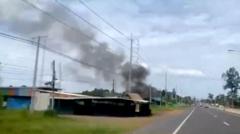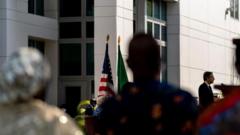The recent border skirmish between Thailand and Cambodia stems from deteriorating relations following a leaked phone conversation that revealed deeper fractures in a long-standing friendship, bringing political and military tensions to a boiling point.
Fractured Ties Ignite Border Conflict Between Thailand and Cambodia

Fractured Ties Ignite Border Conflict Between Thailand and Cambodia
Rising tensions escalate as a surprise phone leak undermines longtime alliances, intensifying military confrontations along the border.
In a dramatic turn of events, military clashes have erupted along the disputed Thailand-Cambodia border, marking a significant escalation in hostilities between the two Southeast Asian nations. Historically, the border has been a source of conflict, with previous skirmishes resulting in substantial human cost, and tensions appearing to have been on the mend following earlier diplomatic efforts.
However, a resurgence of conflict came to a head on July 24, fueled by rising frustrations after a landmine explosion injured Thai soldiers. In the aftermath, the Thai government reported at least 12 casualties, mainly civilians, heightening fears of an extended military confrontation.
The roots of this discord trace back to a shocking leak involving a phone call between Thailand's Prime Minister Paetongtarn Shinawatra and Cambodia's leader, Hun Sen. The leaked conversation, which undermined the Prime Minister's authority and embarrassed her government, has been placed at the center of the rising tensions. Public mood turned against Paetongtarn, resulting in her suspension as Prime Minister as the country grapples with political instability.
The past camaraderie between the Shinawatra and Hun Sen families has soured rapidly. While the Thai former Prime Minister Thaksin had historically leveraged these relations for mutual benefit, his daughter’s missteps appear to have irrevocably altered this equation. Analysts speculate Hun Sen's motivations for exposing this intimate conversation, with potential implications for both military rhetoric and nationalist sentiment in Cambodia.
Beyond verbal hostilities, the fallout has led to tangible repercussions including trade stoppages worth billions and heightened military precautions. Early observations indicate that the situation could worsen if neither side exhibits a willingness to back down, exacerbated by internal political pressure and economic distress in both nations.
As both countries remain paralyzed in political deadlock, the call for diplomatic intervention from regional bodies such as ASEAN grows increasingly urgent. The original intent of ASEAN was to mediate and prevent conflicts among its member states, and its effectiveness is now being tested against the backdrop of rising nationalism and enduring mistrust.
While immediate resolution seems distant, observers believe that veteran politicians like Hun Sen and Thaksin could eventually negotiate a truce, pending the current political climate in both Cambodia and Thailand. The focal point now rests on understanding the underlying factors pushing Hun Sen to incite conflict, from economic interests related to the gambling industry to potential diplomatic distractions amid domestic challenges.




















